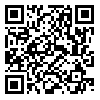Volume 18, Issue 3 (2014)
CLR 2014, 18(3): 127-152 |
Back to browse issues page
Download citation:
BibTeX | RIS | EndNote | Medlars | ProCite | Reference Manager | RefWorks
Send citation to:



BibTeX | RIS | EndNote | Medlars | ProCite | Reference Manager | RefWorks
Send citation to:
Taheri Fadafan1 D, Bagheri Farsani 2 M. The Legal Study of Triple Systems of Executive Management of Election “Governmental, Independent and Mixed Models”; a Calibration of the Executive System of Election in Iran with Three Models and Evaluation of the Idea of the Election Commission Formation. CLR 2014; 18 (3) :127-152
URL: http://clr.modares.ac.ir/article-20-8449-en.html
URL: http://clr.modares.ac.ir/article-20-8449-en.html
1-
1. Ph.D. Student, Department of Law, University of Tehran, Tehran, Iran
2- . Master of Public law, Department of Law, University of Tehran, Tehran, Iran
2- . Master of Public law, Department of Law, University of Tehran, Tehran, Iran
Abstract: (22627 Views)
The legal system governing the administration of elections as a mechanism has been mentioned at the constitutions, statute law and the fundamental customs of the different countries managing accurate and fair election. The significance and rule of the election administration system holding an advised election, has a direct ratio with healthy, clarity and accuracy of the election progress. In the practical praxis of countries, the independent, governmental and mixed models have been formally recognized; as countries following this model can be classified from this viewpoint. In fact, according to the given models, the basic purpose of making electoral institutions is the maximum guaranty of the protection of citizens' votes, and finally, performing a fair election. Although, based on some indicators, the executive management can be divided into several models, it is not possible to decisively assert that the process of implementation of the election in some countries with similar model hold equally; in other words, the model type of the institution of election administration cannot conclusively indicate the implementation of similar process of election of countries. This article tries to legally examine the Triple Systems Executive Management (TSEM) of election in the world and mentioning the Principles of ruling the activity of election institutions. Finally, some propositions regarding the administration of elections in Iran are offered.
* Corresponding author’s E-mail: danyal.mashhud@gmail.com
Keywords: Election, Administrative institution of election, Governmental model, Independent model, Mixed model
Received: 2014/04/25 | Accepted: 2014/12/17 | Published: 2014/12/21
| Rights and permissions | |
 |
This work is licensed under a Creative Commons Attribution-NonCommercial 4.0 International License. |







